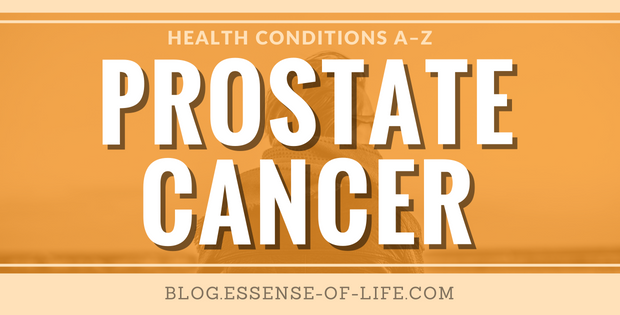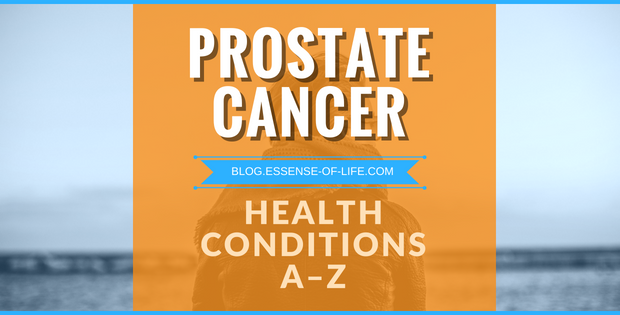Prostate Cancer Treatments: What to Do When You Are Diagnosed with Prostate Cancer

Diagnosed With Prostate Cancer?
Prostate cancer is one of the most common cancers in men, and cases are continuing to rise each year globally. Furthermore, the probability of incidence increases with age. While there are many factors affecting both causes and treatment, here are some important facts to know.
The Prostate
The prostate gland is a walnut-sized gland that is part of the male reproductive system. The prostate gland is partly muscular and partly glandular. While cancer of the prostate generally first occurs localized to the prostate tissue, it can metastasize to surrounding tissue, organs and bones over time. This type of cancer is relatively slow growing, therefore finding and treating it before symptoms occur may improve overall health and longevity.
Prostate Cancer Causes
While researchers do not know exactly what causes prostate cancer, they do know that it occurs when there is a change in the DNA of normal prostate cells. Although the exact cause is not known, there are some risk factors that may increase the chances of normal prostate cells in becoming cancerous.
Prostate Cancer Risk Factors
AGE
Prostate cancer is rare in men younger that 40.
RACE/ETHNICITY
African American men have 58% greater incidence and 144% greater mortality rate than other ethnicities.
FAMILY HISTORY
Having a father or brother with prostate cancer doubles a mans risk of the disease occurring.
EXTERNAL EXPOSURE
Exposure to both ionizing radiation and UV radiation from sun exposure have both been linked to prostate cancer.
SMOKING
Current smokers are at a higher risk of prostate cancer-specific mortality and recurrence.
DIET
Diets high in red meat and low in fresh fruits and vegetables have been linked to prostate cancer.
Prostate Cancer Symptoms
Watch for these prostate cancer symptoms. If you experience any of the common early symptoms, speak with your doctor right away. When prostate cancer progresses past the early stages, it can cause additional symptoms.
COMMON EARLY SYMPTOMS
— Change in urinary frequency, less or more
— Pain during urination
— Inability to empty bladder
— Blood in urine
— Pain in the prostate area
LATER SYMPTOMS MAY INCLUDE
— Weight loss
— Low energy
— Anemia
— Loss of bladder control
— Bone and joint pain
Prostate Cancer Prognosis
Because prostate cancer is slow growing, patients with early detection have the highest survival rate of any other type of cancer. Nearly 100% of men diagnosed will survive more than 5 years after diagnosis if detected early. But, if undetected early, prostate cancer can metastasize to the bones, lymph nodes, and major organs. A more aggressive treatment is needed in these cases as survival rates beyond 5 years are only 30%. This is why early detection is so important.
Prostate Cancer Treatments
If you have been diagnosed with prostate cancer, you and your doctor can discuss the various treatment options available and choose what is best for your situation. Therefore, you and your doctor should fully discuss the benefits and risks associated with each option.
WATCHFUL WAITING
Because it grows so slowly, sometimes this is the first course of action.
SURGERY
The main type of surgery is radical prostatectomy. Surgery is often ineffective if the cancer has spread outside of the prostate gland.
HORMONE THERAPY
Androgen deprivation therapy (ADT) aims to reduce the production of the male hormone androgen in the body, therefore stopping prostate cancer cells from growing. Can cause sterilization.
CHEMOTHERAPY
Chemotherapy is administered IV or orally and is used mostly to treat metastasis to other areas of the body or if hormone therapy is not working.
RADIATION
Radiation therapy is used to shrink tumors and kill cancer cells. Some surrounding tissue damage may occur with radiation treatment.
CRYOTHERAPY
Cryosurgery is the use of very cold temperatures to freeze and kill the cancer cells. It is often used for early stages. There is often nerve damage to the surrounding tissue after treatment.
VACCINE TREATMENT
The cancer vaccine Sipuleucel-T (Provenge) is used to boost the body’s immune system in order to attack and kill the cancer cells. This treatment is used to treat prostate cancer not responding to hormone therapy. Common side effects include fever, headache, chills, nausea, fatigue, and back and joint pain.
ALTERNATIVE TREATMENTS
Finally, there are many alternative prostate cancer treatments available as well. Many people opt to use some kind of alternative treatment alongside the traditional treatment they are receiving. Some of the most commonly used alternative cancer treatments are Rife Therapy, High pH Therapy, Cesium Chloride, the Budwig Diet, and the Alkaline Diet.
Diet and Prostate Cancer
Get started right away by changing your diet. Diet is the #1 most important thing you can do to improve your overall health. The goal is to slow cancer growth while improving immune system function in order to help give your body a fighting chance. A healthy immune system is better able to help repair and rebuild damaged cells.
Unlike healthy cells which have a very efficient aerobic (with oxygen) metabolism, cancer cells use anaerobic (without oxygen) metabolism. Anaerobic metabolism relies on the fermentation of glucose (sugar) for fuel, which is a very inefficient process. Anaerobic metabolism not only creates an energy drain on the body, but also creates an excess of acidic lactic acid as a waste product.
Certainly, cancer creates a very acidic environment in the body. Through diet, you can increase alkaline intake to neutralize these excess acidic wastes. Excess acid in the body creates a range of side effects including joint pain, muscle pain, and tissue damage. Therefore, alkalizing is especially relevant to prostate cancer treatment.
Alkaline Diet for Prostate Cancer
An alkaline diet is the best way to combat lactic acid issues associated with cancer. The goal is to balance your intake of acid-forming foods by increasing your intake of alkaline-forming foods in your diet. While vegetables and fruits are the most alkaline of foods, there is no need to be strictly vegetarian. The goal is to include more high-alkaline foods in your diet, while balancing out the necessary intake of important healthy acid-forming protein-rich foods such as organic meat, wild-caught fish, raw nuts, and gluten-free grains.
FOODS TO EAT
— Fresh Organic Fruits
— Fresh Organic Vegetables
FOODS TO LIMIT
— Dairy Products
— Wheat and Glutenous Grains
— Coffee and Tea
— Alcohol
— Polyunsaturated Oils
FOODS TO AVOID
— Refined Sugars
— Artificial Sweeteners
— Processed Foods
— MSG
— Soy
— Pork
— Hydrogenated Fats
Because diet may not enough to tip the balance back to a more alkaline state in your body, alkaline supplements are important to consider too. High pH therapy focuses on using a combined nutrition and supplement approach to balance body pH. High pH therapy uses a selection of highly alkaline minerals in order to help speed up the affect of an alkaline diet while also providing the body with much needed nutrients.
Improving Prostate Cancer Outcomes
Most of all, when it comes to prostate cancer treatments, it is good to know that there are many options available. A combination of traditional cancer treatment, diet change, and complementary alternative cancer therapies can increase quality of life and improve overall outcome.
SOURCES
https://www.ncbi.nlm.nih.gov/pmc/articles/PMC4203149/
https://www.cancer.gov/types/prostate
https://www.cancer.org/cancer/prostate-cancer/causes-risks-prevention/risk-factors.html
RELATED TOPICS
Do You or Someone You Know Have Cancer? Looking for Options?
The Budwig Diet Protocol: Then and Now

This article is copyright ©2018 Essense of Life, LLC. All rights reserved. Do not copy without permission.
The information contained herein is not medical advice and is not intended to replace the advice or attention of your personal physician or other health care professionals. This information is not intended as a prescription for treatment nor is it intended to diagnose, treat, cure or prevent any disease.
Facebook Comments